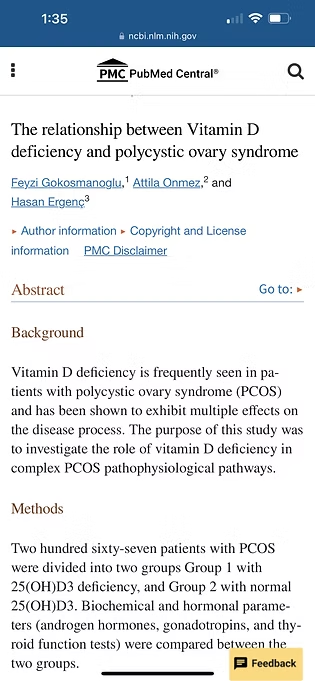In a world where health is paramount, understanding the nuances of our bodies becomes crucial. For those navigating the complexities of Polycystic Ovary Syndrome (PCOS), one simple yet profound element could be the key to a breakthrough: Vitamin D. This vital nutrient, often overlooked, plays a pivotal role in the well-being of individuals dealing with PCOS. Let’s dive deep into the significance of Vitamin D levels and how adjusting them could transform your health journey.
If you’ve been wrestling with PCOS, chances are, you’ve encountered this crucial test. It’s all about Vitamin D. If you’re holding onto your lab results, now’s the time to take a closer look at your Vitamin D levels. Why? Because the science speaks volumes about the link between Vitamin D deficiency and PCOS.
Research unequivocally highlights a direct correlation between insufficient Vitamin D levels and the challenges faced by individuals with PCOS. Observations from clinical practice reveal a common trend: a significant number of PCOS sufferers exhibit low Vitamin D levels. But what’s the ideal benchmark? Aiming for a Vitamin D level around 80 seems to be the sweet spot, offering a beacon of hope for many.
Decoding Lab Results: A Real-World Insight
A glance at typical lab findings for PCOS patients reveals a startling reality. While the normal range for Vitamin D spans from 30 to 100, many find themselves on the lower end, with some numbers as alarming as 6.3. Yes, you read that correctly – a mere 6.3. This figure is not just a number but a wake-up call highlighting the critical need for adequate Vitamin D, a compound vital for the optimal functioning of every single cell in our bodies.
Beyond the Standard: Rethinking Vitamin D Norms
Contrary to conventional wisdom, which may deem a Vitamin D level of 31 as satisfactory, emerging research advocates for higher levels, particularly for those battling PCOS. The goal? Achieving a level around 80 to harness the full spectrum of Vitamin D’s benefits.
Tailored Vitamin D Strategies: Finding Your Sweet Spot
The journey to optimal Vitamin D levels is not a one-size-fits-all route. The required intake could range from 5,000 to 15,000 international units, underscoring the importance of personalized care. Collaborating with a healthcare provider to pinpoint your unique needs is essential for determining the right dosage to elevate your Vitamin D levels efficiently and effectively. Experience shows that individuals with PCOS often need more than the standard recommendation, sometimes exceeding 5,000 units daily.
Join the Conversation: Spread the Word
If this exploration into the nexus of Vitamin D and PCOS has enlightened you, don’t keep it to yourself. Share the knowledge, engage in discussions, and perhaps, help someone on their journey to better health. Remember, every like, comment, and share not only amplifies the message but also joins us together in a community striving for wellness.
By reimagining our approach to Vitamin D intake, especially for those facing the challenges of PCOS, we unlock new possibilities for health and healing. It’s more than just a vitamin; it’s a beacon of hope for countless individuals seeking to reclaim their well-being.
Frequently Asked Questions (FAQ)
Research shows a direct correlation between Vitamin D deficiency and the challenges of Polycystic Ovary Syndrome (PCOS). A significant number of individuals with PCOS have been found to have low Vitamin D levels. This vital nutrient is crucial for the optimal function of every cell in the body, and addressing a deficiency can be a key part of managing PCOS.
While conventional lab ranges often consider levels between 30-100 ng/mL as "normal," the optimal or ideal benchmark for those with PCOS is around 80 ng/mL. This higher level is considered the sweet spot for harnessing the full spectrum of Vitamin D's benefits in managing the condition.
Although a level of 31 ng/mL may fall within the standard "normal" range, it is likely insufficient for someone with PCOS. Emerging research and clinical experience advocate for aiming much higher, towards 80 ng/mL, to effectively support health and mitigate PCOS symptoms.
The required dosage is highly individual and not one-size-fits-all. It can range from 5,000 to 15,000 international units (IU) per day, and sometimes even more. It is essential to work with a healthcare provider to determine your unique needs through follow-up testing, as individuals with PCOS often require significantly higher doses than the standard recommendations.
Vitamin D is a compound vital for the functioning of every cell. For those with PCOS, achieving a level around 80 ng/mL is more than just correcting a deficiency; it's a strategic move that can help transform your health journey, offering a beacon of hope for improved well-being and symptom management.









